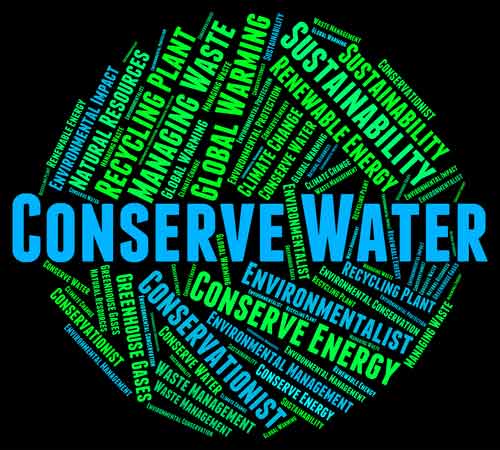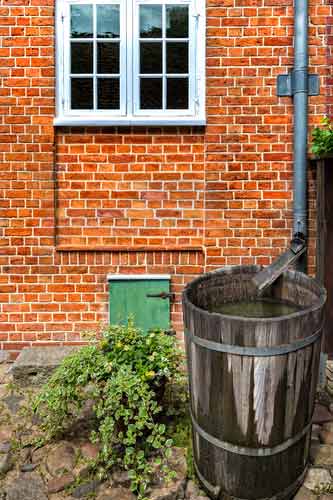Globally speaking, 1 out of every 10 people on this planet have to make do with far less water than they need on a daily basis. And even when water is available and accessible, it often must be sanitized before it will be safe for human use.

Contrast that with the state of water utilized in the United States, where every day 1 in every 10 households wastes 90+ gallons of water just through unfixed leaks. In the summer months, the amount of water each household wastes increases to as much as half of all water used daily.
However, many states within this country are also facing water shortages ranging from mild (Montana) to severe (California). This points to an ever more urgent need to save water for the summer months and our use all year long.
The Biggest Ways Water Gets Wasted
All year round, water gets lost every day without most people even noticing.
Here is a list of the most common issues that interfere with household water conservation efforts:
- Washing dishes by hand with the faucet running continuously.
- Washing vehicles while leaving the hose on.
- Washing driveways with water instead of with a blower or by sweeping.
- Undetected leaking toilets.
- "Slow drip" leaking faucets and fixtures.
- Brushing teeth while leaving the tap running.
- Old appliances that are not water-efficient.
- Running water first to get it hot.
- Watering lawns and the surrounding walkways.
- Leaking sprinkler hoses or faulty dripping spigots.
- Evaporation from pools, fountains, jacuzzis and outdoor water features.
Biggest Summer Water Waste Issues
In the summer, water waste only increases in every conceivable area. But the major culprits are watering lawns and gardens and keeping pools and jacuzzis full of water. Here, evaporation, wind redirection, misdirected runoff, and leaks are some of the main reasons water gets wasted.
But the lack of smart water use techniques also exacerbates the issue, and these can be easily corrected.
How You Save Money by Saving Water
When you think about how hard you have to work to earn a living, it becomes less palatable to realize that potentially as much as 50 percent of the water we purchase and pay for each summer is only being wasted.
According to the U.S. Environmental Protection Agency (EPA), the average household (family of 4 people), uses around 400 gallons of water per day (100 gallons per person). Nearly three-quarters of that water are used indoors with the remaining percentage used outdoors.
In the summer, however, this usage split can reverse, with up to 70 percent of water being used outdoors.
The U.S. Energy Information Administration (EIA) reports that the average household spends about $114 per month on the water with an average per-gallon cost of $12.52.
Example:
You cut your household water waste by 50 percent by replacing worn out toilet flappers, faucet washers, cracked hoses and leaky spigot gaskets. You upgrade to low-flow shower heads. You learn to recycle rainwater and gray water using rain barrels and re-use this water instead of buying more.
So now, instead of each family member using 100 gallons of water per day, you each use 50 gallons per day. Your water bill goes from $114 to just $57 per month.
Over the course of the next year, you save $684. You divvy the savings from your hard work up four ways, and each of you gets $171 of "fun" money to spend on a special treat!
2 Simple Leak Check Tests You Can Do Today
If you are pressed for time, you will want to start by identifying a) if you have leaks (and most households do) and b) how severe those leaks are.
You can do this with two simple tests:

- Toilet leak test. Put two drops of food coloring in the toilet tank. Wait a few minutes and see if the water in the toilet bowl becomes colored. If this occurs, you have a leak. (This is a bigger test than it seems since toilet flushes alone can add up to 27+ percent of a household's daily water usage!)
- Water meter test. Set a period of 2 hours. Before the time begins, read your water meter. During the 2 hours, make sure no one in the house uses any water. When the 2 hours ends, read your meter a second time. If the numbers are not the same, water is leaking out somewhere.
How to Start Saving Water Towards Summer Use Now
Your plumber can fix leaks that are less accessible to you and also do minor repairs like changing out toilet flappers, replacing worn out washers and gaskets, tightening spigots and installing low-flow shower heads and faucet fixtures.
But there are also plenty of other ways you and your family can adopt smart water conservation habits that benefit you and your whole community.
Here is a list of great easy ways to conserve water:
- Get a rain barrel. You can find lots of easy instructions to set it up in a location that works for your home and use the water to hydrate your lawn.
- Do not leave faucets running! Just by turning off faucets while brushing teeth and washing dishes you save many gallons daily.
- Boil water. Don't run the faucet to get hot water - heat it up instead.
- Water early or late. Your grass will thank you!
- Let your grass grow. Longer grass retains hydration so much better.
By working with your plumber to make major and minor repairs and adjusting your water habits to conserve, you will save money for your household and do your part to conserve precious water for everyone.
If you want any advice on how to conserve water in your Orlando, FL home, call Shamrock Plumbing & Drain Cleaning, Inc. today at (407) 305-6183.

